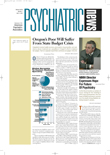On January 31 APA joined the National Alliance for the Mentally Ill and the National Mental Health Association in a call to the 50 states to preserve access to psychotropic medications.
Given rapidly rising Medicaid costs, the statement presents a timely reminder that treatment works, that medication is a crucial component of effective care, and that substandard care leads to avoidable suffering and increased costs.
I believe that although the APA statement is fundamentally correct, we make a crucial error when we argue that psychotropic medications should be exempted from formulary limits and prior-approval programs. If we hold to this position, we will diminish our effectiveness as advocates and contribute to impaired access for our patients.
Our error is forgetting that two wrongs do not make a right.
Formularies have often been too restrictive. Prior-approval programs have often created unreasonable barriers to timely care. These are wrongs. But when we argue—as our Association did in its testimony to the West Virginia Department of Health and Human Services last November—that the best way to contain Medicaid mental health costs and protect quality is “to entirely exempt [psychotropic] medications from limitations to access,” we are also wrong.
Unless we change our position, public officials will see us as a self-protective guild, not a trustworthy, objective source of professional guidance.
In a December 19, 2001, editorial in the Journal of the American Medical Association, Dr. Gregory Simon, a distinguished psychiatric researcher at Group Health Cooperative in Seattle, reviewed evidence showing comparable effectiveness and tolerability for fluoxetine, paroxetine, and sertraline. Dr. Simon concluded that “given the available evidence, it is difficult to criticize formulary policies recommending or requiring one SSRI drug for first-line treatment. . . .All other considerations being equal, an initial choice based on prescription costs is prudent, ethical, and clinically reasonable.”
In light of Dr. Simon’s analysis, and similar analyses that have been done with other classes of medications, it is simply wrong for APA to argue that psychotropics should be “entirely exempt from limitations to access.”
Every Medicaid dollar spent on a first-line prescription for any SSRI other than the least costly is a dollar taken away from improved treatment for other Medicaid beneficiaries.
Rather than advocating for exemption from restrictions, we should work with public officials to ensure that funds for the care of our most vulnerable citizens produce the greatest possible benefit for the affected population.
Paradoxically, in order to promote the widest possible access to needed medications, we must embrace limits. If I ignore evidence about cost-effectiveness and prescribe the most-expensive SSRIs for all my patients, should I be allowed to indulge my preference if that money could otherwise be used for the care of other patients?
The statement in APA’s January 31 press release that “only the patient’s physician should make the decision of which drug to prescribe” suggests that I should be given free rein to do so. That’s just plain wrong.
I am confident that APA leaders would not defend my “right” to deprive my colleagues’ patients of needed medications through cost-ineffective prescribing practices.
In our West Virginia testimony we endorsed “provider education,” “best-practices guidelines,” and “outlier management.” But in my hypothetical example, education and guidelines have not done the job, and outside of physician managed group practices like Kaiser Permanente, outlier management has not been a strong enough tool.
Our Association would do better to endorse clinician-guided, evidence-based pharmacy guidelines that have real teeth in them. For SSRIs, this means mandating which SSRI should be used for first-line treatment and requiring approval for an alternative. This would focus our attention where it really belongs—on developing evidence-driven formularies and a fair exceptions process.
Physicians generally hate prior approval—for good reasons. We are very busy. Prior-approval mechanisms are often time consuming and slow to yield results. Prior-approval programs need to be designed with strong participation by psychiatrists, consumers, and families. In some circumstances—such as the Kaiser Permanente program—psychiatrists will be able to self-manage the exceptions process.
We psychiatrists are not paranoid to fear that mental health patients may be selectively disadvantaged in drug management programs. The history of stigma is all too familiar. The impulse to demand selective protection for psychotropic medications is understandable. It may even be a good short-term bargaining tactic. But two wrongs don’t make a right. When we take positions contrary to clinical evidence and the values of our profession, we do a disservice to our patients and to ourselves. ▪

